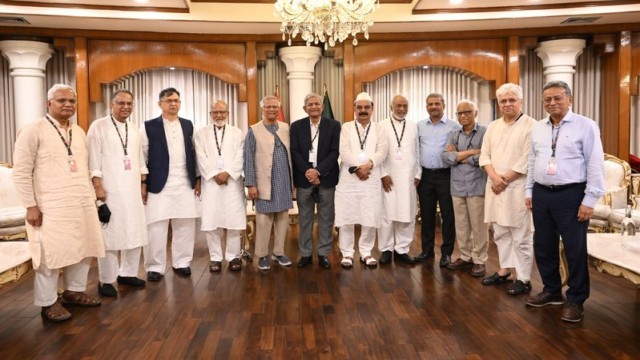
Photo: Ali Hossain Mintu
Chief Adviser Professor Muhammad Yunus meets senior BNP leaders, led by Secretary General Mirza Fakhrul Islam Alamgir, at the State Guest House Jamuna in Dhaka on Sunday, August 31, to discuss political tensions and the upcoming general elections.
Dhaka, Aug 31 (V7N) – Chief Adviser Professor Muhammad Yunus met with senior leaders of the Bangladesh Nationalist Party (BNP) at the State Guest House Jamuna on Sunday evening. The meeting, which aimed to ease ongoing political tensions and initiate dialogue ahead of the upcoming general elections, was rescheduled from the originally set time in the afternoon to 7:30 p.m.
The BNP delegation was led by the party’s Secretary General Mirza Fakhrul Islam Alamgir. Other members of the delegation included standing committee members Dr. Khandaker Mosharraf Hossain, Goyeshwar Chandra Roy, Dr. Abdul Moyeen Khan, Amir Khosru Mahmud Chowdhury, Salah Uddin Ahmed, Iqbal Hasan Mahmud Tuku, and Professor Dr. AZM Zahid Hossain.
Held behind closed doors, the high-level discussion focused on the deteriorating political environment, fairness in the upcoming elections, and concerns regarding state repression. BNP leaders voiced their dissatisfaction over widespread arrests of political activists, curbs on opposition campaigns, and the lack of meaningful reform in the electoral process.
They also expressed frustration over what they perceive as a shrinking space for dissent and civic activism, arguing that the current environment is not conducive to a credible election. The BNP has long insisted that without institutional reforms, particularly regarding the Election Commission and security forces, free and fair elections are not possible.
Professor Muhammad Yunus, who currently heads the caretaker government, reassured the BNP leaders of his administration’s neutrality and commitment to ensuring an inclusive and transparent electoral process. He emphasized that his role is to maintain balance and build confidence among all parties ahead of the polls.
Although no formal press briefing followed the meeting, insiders said that the discussion was “frank and constructive.” Observers note that this dialogue signals a possible thaw in the political impasse that has defined recent months, especially with increasing international concern over the direction of Bangladesh's democracy.
Political analysts believe this could be the beginning of a broader negotiation process involving all major political forces in the country. However, whether concrete outcomes will emerge from these discussions remains to be seen.
The meeting also comes at a time when domestic unrest and criticism of government overreach have raised fears about potential disruptions during the election period. Civil society groups and election observers have called on the interim administration to take urgent steps to rebuild public trust and uphold democratic values.
Further meetings between the caretaker government and other political stakeholders are expected in the coming weeks.
END/SMA/AJ/

Comment: